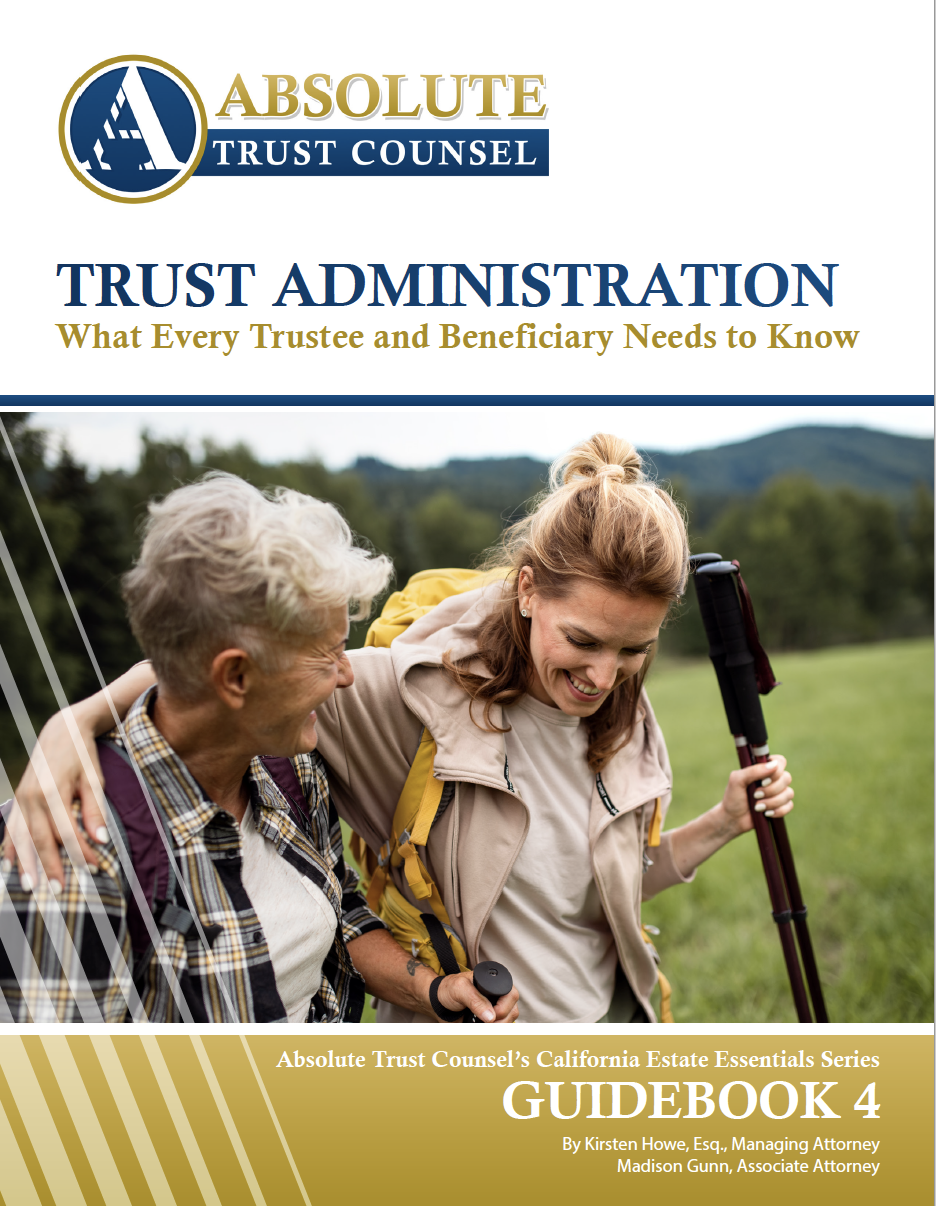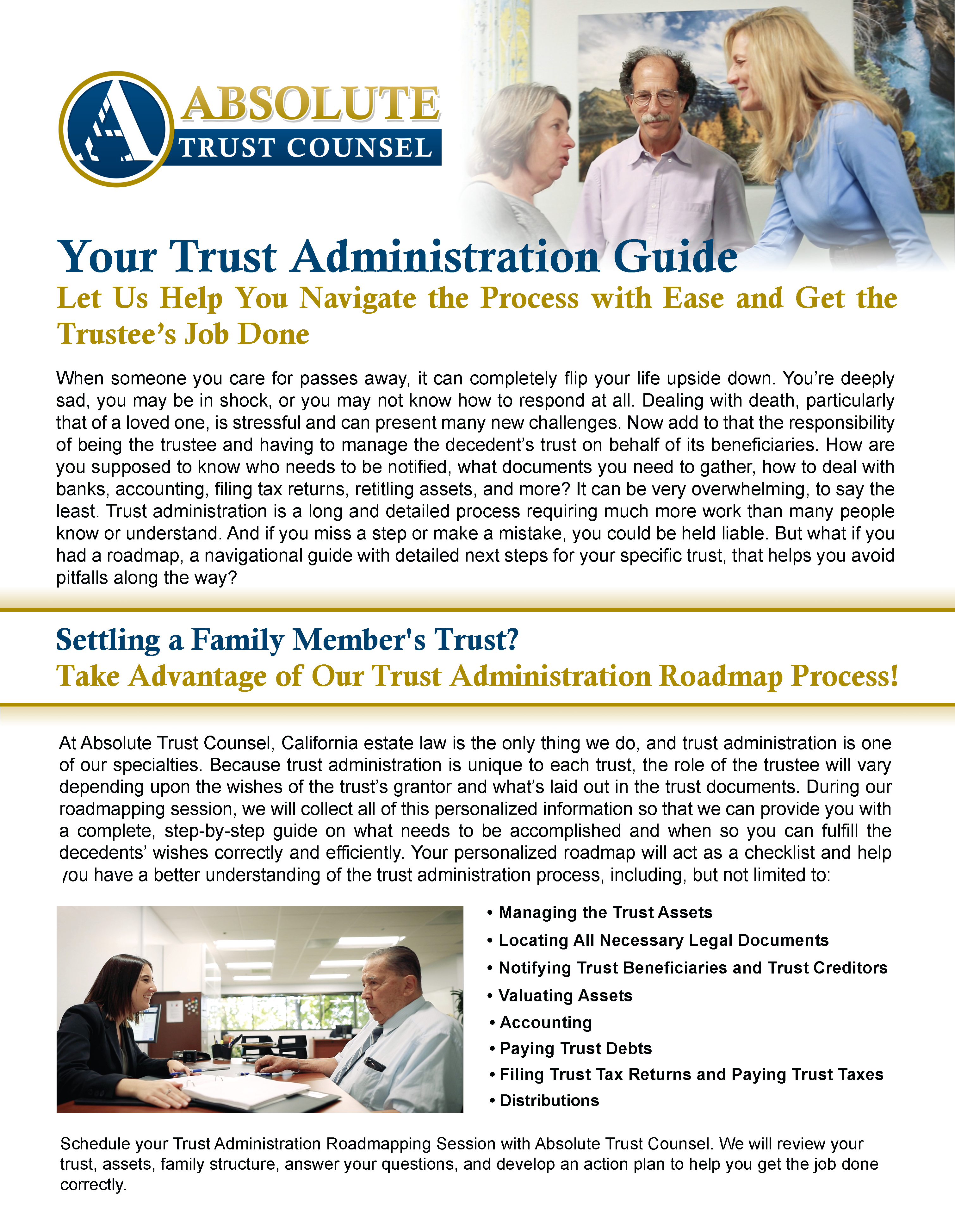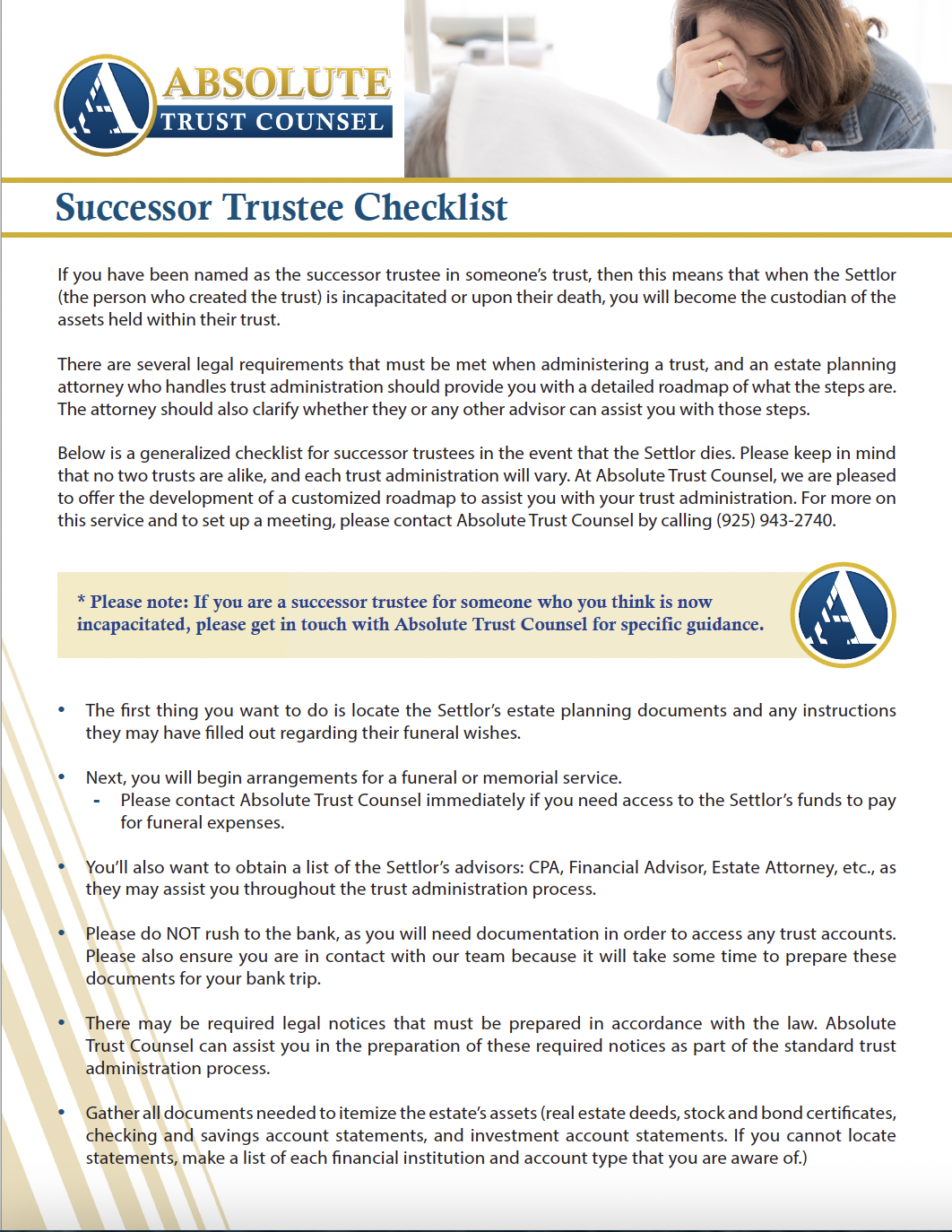A revocable living trust is a document that an individual or couple creates to own their assets and it outlines how their assets should be managed either during their incapacity or after their death. It is typically created to avoid probate, which is the court-supervised process of distributing a person’s estate, either via their will or via the laws in place for people who die without an estate plan. During people’s lives, the revocable living trust has little impact apart from the initial planning process. However, after the grantors (creators of a trust) die, the trust becomes irrevocable, or unchangeable, and it must be administered according to both the terms of the trust and the California Probate Code. Who administers the trust after the grantors die? The Successor Trustee.
Many individuals and couples name family members or friends as their successor trustee(s) in their revocable living trusts. Sometimes they ask those people if they will be trustees and discuss it with them in advance, but what does the job entail?
If you are named as someone’s successor trustee, it is important to note that you are not required to be their successor trustee. It is a significant responsibility and can be quite a lot of work, and not everyone has the time to devote. The trust document will typically name a backup trustee if the first successor trustee declines to act, and there may even be provisions in the trust for the beneficiaries to nominate a trustee if the position is vacant.
If you do choose to act as a trustee, there are several steps to take. A free generalized checklist can be downloaded here.
- Read the trust document carefully, paying particular attention to the family information, who is receiving what assets, and how they are receiving those assets. Do they receive anything outright? Or do you have to have an ongoing trust for a minor beneficiary or a special needs person? Make notes of any special instructions.
- Seek guidance from professionals. Most trust attorneys can advise on the legal notices and duties that the successor trustee must adhere to that are not written out in the trust document itself. You can also hire an attorney to assist you with the legal work and even communications with beneficiaries, and that is strongly advised. You will want to seek out a Certified Public Accountant (CPA) to prepare the trust’s tax returns and obtain a taxpayer ID from the IRS – yes, the trust is now an entity and must file its tax returns. Talk with a financial advisor, preferably the one who was managing the trust assets before the trustors died – you will need a good grasp of the trust’s investments.
- Gather all necessary documentation, including the trust, any amendments, wills, and any codicils. Gather family information from friends or family, find the address book, or look through cell phones to find addresses and phone numbers. Looks through the grantor’s mail for any bills, debts, etc. Look for the grantor’s professional advisors’ information: their CPA/tax preparer, estate planning attorney, financial advisors, etc.
- Gather all asset information and review. You will need to identify what is in the trust and what is outside the trust. Assets outside the trust either will pass by beneficiary designation, or they need to be put into the trust using either a Small Estate Affidavit, a Heggstad petition, or, worst case scenario, probate.
- Notify all interested parties. Interested parties would be any person or organization named in the trust along with any legal heirs of the grantor. Keep beneficiaries reasonably informed of your timeline.
- Create an inventory of all trust assets, or what should be trust assets, including real property, bank accounts, investment accounts, businesses, and personal property such as vehicles, jewelry, and artwork. Obtain their values as of the date of death. This could mean paying for a professional appraisal of the assets.
- Marshall the trust assets. This means obtaining control of all trust assets in your capacity as trustee and managing those assets responsibly. This could mean paying bills, filing and paying taxes, collecting income, and making investment decisions under the terms of the trust and the applicable laws governing you as a trustee.
- Maintain records and stay organized. As a trustee, you are responsible for preparing an accounting of your actions as a trustee. Accounting can be very cumbersome if you do not keep good records. You are liable for any transactions that occur but that you do not disclose in the accounting, so keep good records and disclose everything in the accounting to the beneficiaries. Do not commingle any trust assets with your assets.
- Maintain your fiduciary duty. As a Trustee, you have a fiduciary duty to the beneficiaries of the trust, and you must exercise care, loyalty, and impartiality when making decisions related to the trust and its assets.
- Seek court approval if necessary. If you are concerned about an action that you wish to take or the trust is ambiguous in any way, you can petition the local court for guidance.
This is a general guide. We strongly suggest hiring an attorney to assist with the trust administration process. They can usually help organize the administration and keep you on track. It is also crucial to work with financial advisors and accountants to round out your professional advisors for the trust administration. Often, the advisors are familiar with trust administrations and the process, reducing communication issues and resulting in a smoother trust administration process.
At Absolute Trust Counsel, as part of our trust administration process, we offer a Roadmap that is a detailed task list, customized to your trust administration needs, and a meeting with an attorney to discuss what steps you need to take as a successor trustee if the grantor, or creator of the trust, has died or become incapacitated. To schedule a 20-minute discovery call to get to learn more about the roadmapping process, please get in touch with us today by calling 925.943.2740. And if you haven’t already, please explore our library of guidebooks and reference tools. Below we have listed a few that directly relate to trust administration.

Guidebook 4:
Trust Administration – What Every Trustee and Beneficiary Needs to Know
Are you a Trustee or Beneficiary? Trust administration is much more work than it seems. Let us help you navigate the complicated steps required by law.

Reference Guide 10:
Your Trust Administration Guide
Trust administration is a long and detailed process requiring much more work than many people know or understand. And if you miss a step or make a mistake, you could be held liable. Download a copy of our Trust Administration Flyer for more information on our roadmapping session and how to get started.

Reference Guide 12:
Successor Trustee Checklist
If you have been named as the successor trustee in someone’s trust, then this means that when the Settlor (the person who created the trust) is incapacitated or upon their death, you will become the custodian of the assets held within their trust. There are several requirements you must meet when administering a trust and this checklist will give you a brief overview in the event that the settlor dies.


